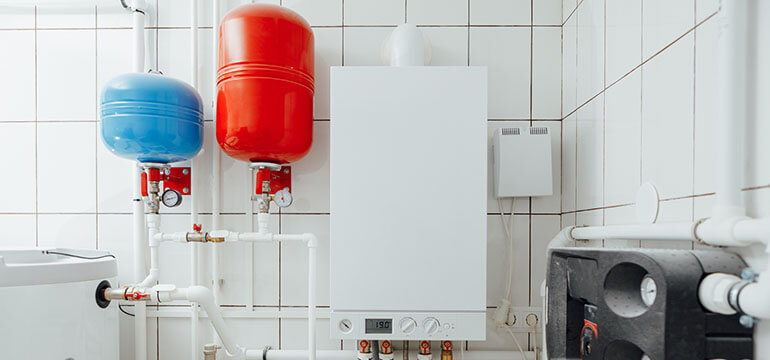Answer these simple questions and we will find you the BEST prices
Which type of solar quotes do you need?
It only takes 30 seconds
100% free with no obligation

Get up to 3 quotes by filling in only 1 quick form

Slash your energy bills by installing an energy efficient boiler

We’ve helped over 500,000 homeowners reduce their carbon footprint
- GreenMatch
- Boilers
- Boiler for Underfloor Heating 0
Boiler for Underfloor Heating: A Complete Guide


As its name suggests, underfloor heating is a type of central heating system fitted under the floor. If you install one of these, it will help you not only to free up space -if replacing radiators- but to add a sense of luxury to your home.
They heat your floor at a low temperature to ensure that every inch of the room surface is comfortable and evenly warm. But this is not their only benefit. Did you know that, compared to radiators, underfloor heating can save you up to 25% on your energy bill? It is due to its higher energy efficiency. Additionally, it requires little to no maintenance after installation.
All of the above reasons are strong enough to look into connecting underfloor heating to your boiler. In this article, we’ll explore the possibilities of connecting underfloor heating to your boiler, including if you will need a new boiler for the in-floor heating to work.
Since the price you will end up paying for a new boiler varies depending on your personal circumstances, we highly recommend that you find and compare boiler prices from local suppliers before deciding. Luckily, Greenmatch can help you by providing up to 3 no-obligation quotes from our network of trusted suppliers. This way, you can find the best price and save money. Get started to get offers at no cost by simply clicking the button below.
- Quotes from local engineers
- Payment by finance available
- Save up to £975
It only takes 30 seconds



Can you run underfloor heating off a boiler?
In short: yes, using a boiler for underfloor heating is possible. Before going through the underfloor pipes to heat the room, a boiler can heat the water that warms your floor.
Let’s dive a little further into the topic.
What kind of boiler do I need for underfloor heating?
You don’t need a specific kind of boiler for underfloor heating. If you already have a regular, system or combi boiler, you should be fine. However, some boilers may need minor adjustments to be fully compatible with the in-floor heating system.
Can you have underfloor heating with a gas boiler?
Yes, you can have underfloor heating with a gas boiler. However, some adjustments are needed depending on the type of gas boiler you have.
Underfloor heating will work well if you already have a conventional gas boiler. On the other hand, gas combi boilers will need minor adjustments.
Can you run underfloor heating off a combi boiler?
Yes, you can run underfloor heating off a combi boiler. However, you may need a two-port valve installed to ensure that your gas combi boiler can run your central heating and underfloor heating separately.
Without this valve, your boiler could overheat when running both systems at the same time. A qualified heating engineer can install this component for you.
Is there a best boiler for underfloor heating?
There is not just one best boiler for underfloor heating. Every household has different needs; thus, each one may need a different boiler for its in-floor heating system.
Once you have a better idea of your home’s requirements, you can decide on a specific type of boiler. Nevertheless, there’s a good chance you already have a boiler that works well with underfloor heating and only needs some minor adjustments.
Can you mix underfloor heating with radiators?
Although underfloor heating is often seen as an alternative to radiators, both can go hand in hand. You can have both systems running off one boiler.
This is often done by creating zones that can be warmed up by a different type of heating. For example, many UK homeowners have underfloor heating installed on the ground floor, while radiators heat the upper floors. If you’d like to have a radiator in the kitchen, but underfloor warming in the living room, creating zones is the way to go.
Zones can overlap too. You can have a radiator and underfloor heating in the same room if you wish.
What size (kW) boiler for underfloor heating?
Boilers come in many different sizes: both in terms of physical dimensions and output. Whenever we refer to the ‘size’ of a boiler, however, we mean the output. This is usually measured in kilowatts (kW).
The size of the boiler is of great importance. A boiler that’s too weak for your home will struggle to heat up fully, so your hot water won’t get warm enough. On the other hand, if a boiler is too strong, it will cause your energy bills to rise without reason.
What kW boiler do I need for underfloor heating?
The boiler size required for underfloor heating differs per household. Because of that, it’s unfortunately not possible to give a straightforward answer. There are several factors at play, such as:
Underfloor heating boiler temperature
The optimal underfloor heating boiler temperature differs per household. In general, underfloor heating only needs a maximum flow temperature of 55°C. A temperature of 50°C flow and 40°C return is very common too.
For an exact indication of the ideal heating temperature and what size boiler you need, we recommend that you contact an engineer who can assess your home. An easy way to do this is by comparing quotes. By filling in the no-obligation form with your specific needs, we will come back to you with up to 3 offers from companies near you.
- Quotes from local engineers
- Payment by finance available
- Save up to £975
It only takes 30 seconds



Which is cheaper to run: electric or water underfloor heating?
Water underfloor heating is cheaper to run than electric underfloor heating. However, it’s not quite as simple as that. Let's explore both possibilities further.
Water underfloor heating consists of heating pipes installed below the floor. The pipework connects to your boiler or heat pump, which makes this type of underfloor heating difficult to install during renovation projects. It is, however, ideal for new-build projects and large areas.
While the installation time is lengthy and the installation costs are more expensive than those of electric underfloor heating, the running costs are often considerably cheaper. For that reason, water underfloor heating is often the better option from a long-term perspective.
Electric underfloor heating consists of cables or mats that connect to the electricity network. This electricity then gets converted into radiant warmth, which heats your home. The mats and cables are easy, quick and relatively cheap to install. That makes electric underfloor heating ideal for renovation projects and small rooms.
Unfortunately, the running costs are often more expensive than those of water underfloor heating, which makes a water system a better alternative.
Electric boiler for underfloor heating
Underfloor heating doesn’t require high temperatures like radiators do. Nearly all underfloor heating systems only have a flow temperature of around 50 degrees Celsius. Because of these lower requirements, you can use an electric boiler for underfloor heating or any other kind of boiler. Just 6 kW of power can be enough.
Best electric boiler for underfloor heating
There’s a wide variety of electric boilers suitable for underfloor heating. So many options available mean that the best electric boiler will vary from house to house. A few things to keep in mind:
Once you’ve got a good idea of those factors, you can look into which electric boiler is the most suitable for your home. As you see, selecting the one that best suits your home's requirements is not easy. However, there’s a simple way to find out which boiler is the right one for you.
Contacting a professional installer is the best way to find out which electric boiler for in-floor heating is the right one for you. You can easily do this by filling in our form. We’ll get you up to 3 tailored quotes from suppliers in your area. The service is free and non-binding!
- Quotes from local engineers
- Payment by finance available
- Save up to £975
It only takes 30 seconds



Frequently asked questions
A boiler isn’t always a requirement if you’d like to have in-floor heating. Electric underfloor heating, which consists of cables or mats that connect to mains electricity, can run without a boiler. However, it’s not always the ideal method to use. Learn more here.
Underfloor heating can work with all modern condensing boilers. However, your boiler may need adjustments to run the in-floor heat without overheating. Find out more about these possible changes here.
Underfloor heating doesn’t necessarily replace radiators. There are ways to let both heating methods go hand in hand. Find out more about mixing underfloor heating with radiators here.
You don’t necessarily need a new boiler for underfloor heating. All modern condensing boilers can work with in-floor heating. Your old boiler may need to have a new valve installed, though. Learn more about the installation here.

Nils is a content writer for GreenMatch with a background in SEO and blogging. Nils plays a major part in getting content ideas up and running. He also sometimes takes the pen in hand to write informational articles about renewable energy, sustainability and green technologies.
We strive to connect our customers with the right product and supplier. Would you like to be part of GreenMatch?





